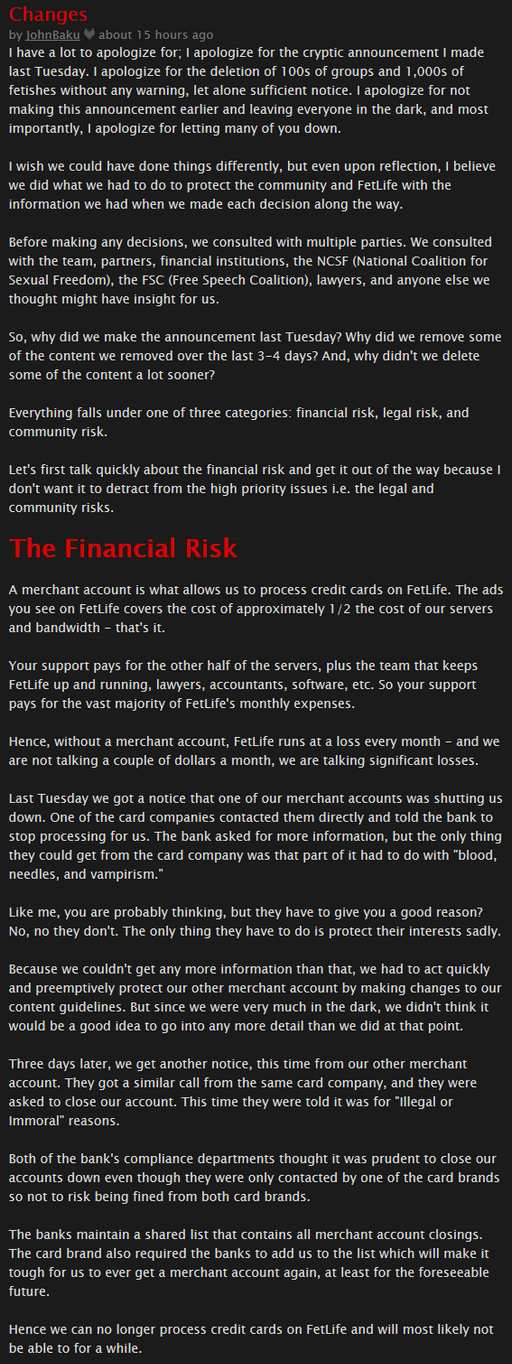|
|

The Sex Blog Of Record
ErosBlog posts containing "Pornocalypse"
October 23rd, 2017 -- by Bacchus
I woke up this morning to unwelcome news on Twitter. A few days ago, Patreon quietly (which means, without actually notifying the people who use its platform) updated the Adult Content portion of its Community Guidelines in an unequivocally porn-hostile way:

This is a substantial change after a long period of stasis. As recently as September, Patreon had not changed these guidelines since I analyzed them in detail back in 2016, when I was still agonizing over whether to solicit pledges on a platform that was then explicitly “not for porn” but which advertised its openness to “adult content” and promised to clarify the distinction in future policy updates. As I explained then:
I’ll admit I’m of two minds. I’m so offended by undefined “no porn” policies that I want to piss on the toes of every company that trots one out. But I also find myself tempted to give Patreon the benefit of the doubt just now. It’s possible they’re doing the best they can for adult content creators, in the context of a business/financial environment that is implacably hostile to us.
Notice two things. First, there are no reports going around that anybody has been kicked off of Patreon, had their money held, or suffered any adverse consequence of the new guidelines. Yet. So if this truly be #pornocalypse come to Patreon, it’s the sound of the hoofbeats in advance of the dread horseman, not the horseman himself.
The second thing I would have you notice requires your keen focus on the true meaning of #pornocalypse, which is a word that everyone, including me, throws around very loosely. But in its most precise usage, #pornocalypse is a financial term. It refers to that precise moment in an internet company’s business life-cycle where the business value of having “adult” content on the platform (popularity, users, traffic, coolness, network effects, buzz, et cetera) is suddenly outweighed by the detriment to the company of having to justify the presence of that adult content to bankers, stockbrokers, and venture capitalists. These financial-industry people are universally conservative to the point of squeamishness about sexual content in the businesses touched by their money, no matter how libertine they are in their personal lives. And so the pornocalypse always comes, as predictable as clockwork, to an internet company that’s going through a significant financial transition.
Hmmm, didn’t I recently get a bland email from Patreon about exciting developments, something about sixty million in new venture capital? Sure enough I did…
So yes. The way this works is that Patreon cannot afford to have anything in its system that might offend any of its new financial overlords. The new guidelines may or may not be followed up with new hires whose job is to go through and start throwing indy porn projects out of the system; let’s hope not. Best case is that the guidelines are to make things clear-cut so that when some indy porn site gets a bit of press buzz and the headline “Patreon-supported Porn Site Blah Blah Blah” starts trending in the business press, Patreon’s managers will have clear cause to nuke that unfortunate site from the system before Patreon’s venture capitalist backers can get on the phone to complain about reputation damage.
How much does this affect the ErosBlog Patreon? Not, I think, much; my status was ambiguous before and it remains ambiguous. The ErosBlog Patreon was fragile before and it remains fragile. This has been my position since I started exploring crowd-funding options:
I’m proud of the fact that everything I do is porn, even if it’s also erotic art curation or forensic photoarcheology or deep-dive provenance research into viral photographs or reluctant investigative journalism and cynical commentary about platforms used by pornography enthusiasts. So I’m looking for a crowdfunding platform that won’t make me lie about what I love to do. I don’t doubt that with a bit of careful fancy-dancing I could use one of the porn-squeamish platforms, at least for awhile. But I would hate to get invested (or to get my patrons invested) in a platform where the official policy is to prohibit porn officially while tolerating it on a case-by-case basis as long as it doesn’t get too uppity.
I have contacts in the Bay Area. Through one of them, I heard a sort of personal rumor that the Patreon team was committed to trying to make the platform work for adult content creators. I knew it wouldn’t survive the first big financial phase change, but what the hell; I decided to get down off my high horse and give them a shot. And so, I set up my Patreon to emphasize my digital curation and provenance work with vintage erotic art, which should be equally fine under the new wording or the old. But I’ll probably want to revise the pitch a bit to put less focus on supporting this blog, which is still a porn website in my own eyes if (perhaps) not the kind of pornographic material production that Patreon is newly prohibiting. Who knows? It’s not like any of us will get a chance to lawyerlips our way out of a ban anyway; when the #pornocalypse comes for you, there’s usually no appeal. So be careful out there, people!
June 20th, 2017 -- by Bacchus

So today some of the people who have porn tumblrs got an email that reads in part as follows:
We wanted to give you a heads-up that we’ve made some changes to our content policies. Starting July 5, 2017, blogs that primarily contain explicit content won’t be visible to minors, people who are using Tumblr in Safe Mode, and people who aren’t logged into Tumblr.
(Emphasis added.)
Put it another way: Verizon/Yahoo/Tumblr is sweeping the porn Tumblrs under the rug, or to put it another way, is locking it inside their walled-garden data silo. Your porn Tumblrs will no longer be a part of the open web. They will become invisible to the broad universe of everyone who is not (a) already a member of the Tumblr community and (b) willing to be logged while they surf their Tumblr porn so that their porn surfing habits can be more readily tracked and aggregated across all their different devices, IPs, VPNs, and fap sessions.
Although the email does not say so, I predict that explicit-content blogs will go back to flying that involuntary robots.txt that makes them invisible to the search engines, too. No more outside search-discovery for Tumblr porn!
We all knew that Tumblr’s run as the place to run free porn blogs had to end someday. It looks like July 5 is to be that day.
Similar Sex Blogging:
January 19th, 2017 -- by Bacchus
It’s time for another timely reminder that the credit card companies are why we can’t have nice adult things online. Well, to be fair, I suppose it’s the credit card companies and their shadowy political masters. Like that makes it better?
Start with some background. This post is about FetLife, a famous social media platform for kinky people that (despite its reputation for having some serious flaws) leveraged its early-mover status into a lock on its market segment. FetLife is by all accounts the place for kinky people to congregate online.
You’ve never seen much on ErosBlog about FetLife or about the goings-on there, because nothing that happens on Fetlife is visible on the open web. You have to join up and be logged in to see anything there, which makes the site not part of the internet as far as I’m concerned. As I explained more than seven years ago:
When I’m blogging, I’m swimming in an ocean of material, trying not to drown in it. There’s more published every minute than I could read in a month – and that’s just on the “open” internet, the part where the links work for everyone and there aren’t any passwords or secret knocks.
By policy, I don’t even try to read or look at anything that’s friendslocked or passworded or semi-private. Anything like that is symbolically flagged “this is not for the whole world to see.” And I’m a blogger who can’t even manage to skim all the public stuff that’s out there. Why would I waste my time getting permission to look at controlled stuff, and then actually looking at that stuff, when I don’t even have time to look at all the open stuff that I need to see every day?
I conceptualize anything that’s behind an access control as being dead information, not part of the live internet and thus not part of my conceptual realm. I don’t have time for it and I don’t have room for it in my head. It might as well not exist for me, because knowing stuff I can’t blog about is only going to make my blogging life more difficult, never richer or easier.
It turns out there was a #Pornocalypse-inspired massacre at FetLife recently, with thousands of fetish categories deleted without notice and without (at first) any explanation. Violet Blue explains it this way:
Recent censorship enacted at FetLife is the result of financial discrimination by multiple credit card processors who have ceased business with FetLife for what the processors claim are “Illegal or Immoral” reasons. It began for users one week ago when FetLife announced changes to content guidelines, stating “We can no longer allow FetLifers to publicly share sexual pics and vids containing blood visible in them.” Then without warning, Fetlife deleted hundreds of groups and literally thousands of fetish categories that represented a range of kinky communities (like ones with hypnosis, blood, and humiliation in the name). This was in response to to significant pressure from FetLife’s credit card processor.
Although I try to reserve the word “censorship” for situations when the government attacks our speech freedoms, it’s not clear that Violet’s word choice isn’t correct in this case. The lame explanations allegedly provided by the credit card company to FetLife’s processing bank have the stench of Operation Choke Point about them. That’s the secretive program run by the US Department of Justice to deny banking services to (among others) adult businesses. Although Operation Choke Point was supposed to have been officially terminated in 2015, there’s serious reason to doubt that it ever actually stopped.
Among those reasons, I now feel that we have to include FetLife’s current banking difficulties. FetLife has finally gotten around to posting an explanation for its members, and someone has helpfully schlepped it out onto the open internet where we can see it:

That’s just the first part; there’s more.
FetLife received the same sort of vague and conflicting excuses from its card processor that the victims of Operation Choke Point typically reported hearing. I’m not sure how far we should credit the story of Operation Choke Point’s alleged demise.
Similar Sex Blogging:
May 31st, 2016 -- by Bacchus
This is awesome! Franklin Veaux writes:
A couple of years ago, I discovered that the number of books I was selling suddenly fell off a cliff. I did some research and found that the same thing was happening to a lot of erotica writers, especially self-published writers. Amazon’s Search function on their Web site was filtering out a lot of erotica, particularly erotica with themes of non-traditional relationships like BDSM.
However, I discovered something interesting a few months back: The Amazon search API, a set of programmer’s tools that allows Web programmers to search Amazon’s book titles, doesn’t filter search results. You can log on to Amazon and do a search for a particular book and see no results, but if you write a Web site that uses Amazon’s API and do a search, ta-da, there it is!
I’m sure you can see where this is going.
On and off for the past few months, I have been working on building a new Web site, called Red Lit Search. This site has a database of erotic books in Amazon’s catalog–so far only about eighteen hundred or so, but the list is growing — and also allows you to do uncensored searches of Amazon.
Way to go Franklin!
Similar Sex Blogging:
March 22nd, 2016 -- by Bacchus
This article in Motherboard about sex robots could be (but isn’t) headlined “Patent Trolls Are Why We Cannot Have Nice Things.” It’s a worthy article that dives deep into that subject, although I believe the tech summary at the top (intended to establish the unwelcome truth that making a sex robot is an insanely-complex technical challenge) is too pessimistic, or to put it another way, in my opinion it sets the bar too high on the robotic features we’d need to see in a commercially successful and sexually satisfying sexbot.
But that’s not why I’m blogging about this article. Instead, I want to commend it for its summary of the financial challenges faced by innovators in sex tech. It’s as neat a summary of the #pornocalypse phenomenon as I’ve seen, and it confirms my long-argued theory that it’s the involvement of the investor class that drives the exclusion of sexuality from any modern business or product:
It’s an unfortunate reality that many sextech companies find it difficult to get small business loans due to morality clauses and banks’ concerns over “reputational risk.” And investors too are wary of sextech. Quitmeyer has lost count of the number of times he was invited to show investors a deck, only to be told afterward that while Comingle’s work is great, investors simply don’t fund things that fall under the category of “sex, drugs, and rock ‘n’ roll.”
“The amount of publicity that we’ve been able to gain at Comingle — if we were any other Silicon Valley startup, we’d already be in our A-round of funding upwards of millions of dollars,” Quitmeyer said.
“We’ve been kicked out of two accelerators!” he added. “We passed all their hoops and training and customer discovery and at the end, when they’re supposed to give you space and funding and support, they came back and said, ‘we checked with the higher-ups and turns out we’re not comfortable dealing with sex stuff. Goodbye.’ Months lost.”
…
Sextech companies also face restriction from other companies: Google and Apple, for example, grudgingly allow sex-related health apps, but their acceptance of sextech that exists solely for pleasure and titillation has so far been spotty. Would Play or the App Store let you gear up your sexbot as you begin your commute home from work in the same way they let you do with your Nest? Their track record doesn’t bode well for sexbots.
This turns off investors, too. Sean Percival, a venture partner with the seed investor firm 500 Startups in Mountain View, told me that being barred by such key distribution channels is a serious handicap for a company.
“Getting rejected [by a main distribution channel like Play or the App Store] would make it difficult for you to scale,” Percival said.
Similar Sex Blogging:
November 13th, 2015 -- by Bacchus

This painting is Modigliani’s Nu couché, or “Reclining Nude” as it is usually rendered in English. To my pornified eye, it is no thing at all — a crudely-rendered oil painting with muddy colors, of interest (if at all) for the expression on the woman’s face. But that is why they don’t let me into fancy auction houses. Former taxi driver and current Chinese billionaire Liu Yiqian thought it was worth 170 million bucks, and for that price bought it this week.
And here’s where it gets interesting. As Mashable reports, the financial press (but pretty much nobody else) found the painting too shocking to put on TV, and felt the need to fuzz out the naughty bits (tits included!) for its audience of stockbrokers and mature persons of business. CNBC, Bloomberg TV, the Financial Times — none of them thought their audiences could handle this boring old canvas in its filthy uncensored glory:


This cannot possibly be a “protect the children” impulse. How many children do you know who watch CNBC? Or who read the Financial Times? I can only speculate about the true motive, but to me it speaks of the reasons underlying the #pornocalypse. I’ve mentioned before that #pornocalypse begins to show its ugly ass when an internet company reaches that certain stage in its life-cycle where bankers and stockbrokers are getting involved. Steve Jobs {spit!} aside, the anti-sex squeamishness typically isn’t coming from the tech industry, it shows up when it’s time to start dealing in serious money.
I don’t know why financiers can’t handle a little bit of nudity in their financial reportage. But there’s nobody more slavish toward the whims of money than a financial press editor. I think we can safely trust that they know their moneyed audience. Call this proof of a sort: the #pornocalypse is an artifact of the prudishness of the rich.
Similar Sex Blogging:
October 17th, 2015 -- by Bacchus

It’s no secret that since 2005 or so, I have attempted to make a living at sex blogging. What may be news (if hardly surprising) is that I am no longer succeeding. The single biggest reason (and what I currently perceive as my largest business challenge) is that in 2015 there is no hope of growth in web traffic without social media, and social media companies are (predominantly) hostile to adult content. Generalizing: you can’t put (or link to) smut on social media, you can’t grow or even maintain your web traffic without social media, and so it’s very hard to make money on the adult web. Traffic and revenue decline, and there’s no way to chase it where it is. Back in 2012 at ErosBlog’s 10 anniversary, I wrote:
But what about the future? Will ErosBlog still be here in 2017? I’m less confident than I was in 2007; I grow older and move more slowly, while the world speeds up and accelerates into the future. But I’m persistent, and I’m stubborn. Unless I stop being entertained by porn (which seems unlikely) I can’t imagine not having bits of it that need pointed at and talked about. So, just as I did in 2007, I’ll say “I truly do hope so!”
I still hope so, yes I do. But it’s no longer clear that ErosBlog can survive as a profit-making enterprise. One of these days it may become a hobby, and a hobby with a much cheaper and less reliable server at that. I sometimes flatter myself that crowdfunding might offer a way forward, but it’s not immune from #pornocalypse either.
Enough about ErosBlog. Icons of the adult industry much bigger than me are struggling with the same dynamic. When your problems are also Hugh Hefner’s problems, you’re at least in good company. When I drunkenly posted the other night about the then-breaking news that Playboy was going to be putting panties on all of its Playmates going forward, commenter André adroitly identified the story as a #pornocalypse situation:
Pornocalypse comes to Playboy. Of all places. It was a common sense business decision, apparently. Porn is everywhere, so Playboy had long lost their edge, and in an age of sanitized social media, their only way to make it into mainstream platforms (Facebook et at) to — in their mind — secure a viable future (doubtful!) was to clean their act up and hide the nudity that offends the terms of service of those platforms.
André should write for Wired magazine. Here’s Wired:
Times have changed. Nudity and pornography are ubiquitous on the Internet. And people are buying fewer magazines overall, choosing instead to read online. Meanwhile, those same readers increasingly come to stories through third-party platforms like Facebook, Twitter, and Pinterest. Those platforms have their own rules, and often prohibit or limit nudity. For Playboy to survive in a platform-driven world, the pressure to conform to those standards is immense–so much so that the publication is abandoning the core of its brand’s identity.
This isn’t really a new thing for Playboy. The company already transitioned its website away from full nudity, for the same reason:
Playboy’s shift isn’t completely new. The magazine re-launched Playboy.com last year “as a safe-for-work site,” and has seen significant success. “Tens of millions of readers come to our non-nude website and app every month for, yes, photos of beautiful women, but also for articles and videos from our humor, sex and culture, style, nightlife, entertainment and video game sections,” the magazine says.
The company’s chief executive, Scott Flanders [says] that some content was made SFW “in order to be allowed on social media platforms like Facebook, Instagram, and Twitter.” The Times also reports that following the website’s shift away from nudity traffic to the site increased “to about 16 million from about four million uniques users per month” as “the average age of its reader dropped from 47 to just over 30″–in other words, a demographic totally at home on social media.
Here’s the Wired summary of social media’s hostility to adult content:
On many social media platforms, the so-called community standards barring explicit content aren’t that different from what Hefner felt he was rebelling against when he famously published Marilyn Monroe’s nude centerfold back in 1953. Facebook, the company says, “restricts the display of nudity because some audiences within our global community may be sensitive to this type of content.” Twitter requires that sensitive content like nudity be marked as such so it can be hidden behind a warning. Celebrities and activists have had little luck in their campaign to have Instagram “free the nipple.” Apple’s App Store guidelines, meanwhile, warn that “apps containing pornographic material… will be rejected.”
This, my friends, is why we can’t have nice adult things. Discovery is no longer via search. (Google killed search for adult sites several years back anyway.) Discovery is via social media. And social media is hostile to adult. It’s not just me. Maybe “Bacchus” at a dumb little 13-year-old sex blog just doesn’t “get” how to market on the modern platforms-and-silos internet. But when freakin’ Hugh Hefner himself abandons the core of his venerable brand, which is models wearing no panties, because the social media platforms are hostile to ladies without panties? It’s not just me. It’s a thing.
I think I shall call it #Pornocalypse.
Similar Sex Blogging:
|
|














